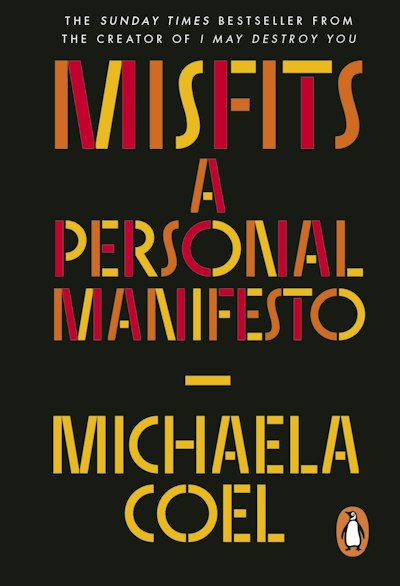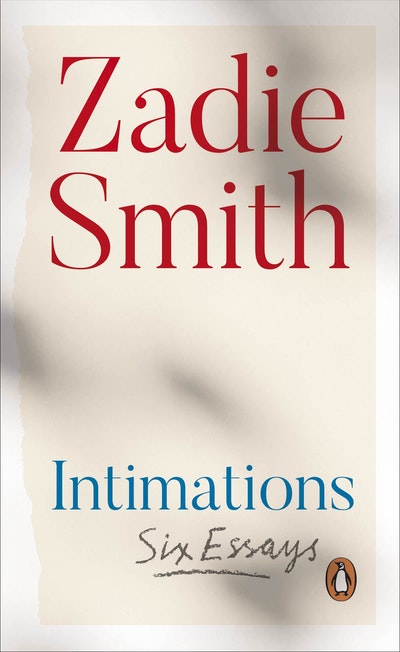- Published: 7 September 2021
- ISBN: 9781473596399
- Imprint: Ebury Digital
- Format: EBook
- Pages: 128
Misfits
A Personal Manifesto
Extract
INTRODUCTION
Hello,
Thank you so much for picking up this book and peeling back the first page to discover its contents.
I will do what I’m best at: tell stories, in the hope that you’ll be able to connect the dots, find threads to tie together.
I like TV, I like making burritos and I like my friends, so sometimes I combine all three by inviting friends over to make burritos and watch telly on my projector. One night back in 2018, my friends complained that the smell of the onions I was chopping was too strong and opened up the window. Cue a moth now dancing around the projector light, interrupting the visual perfection of Stranger Things. Moths disturb me, my peace and my flow, with their incessant fluttering. Their erratic, unpredictable movements get me the hell anxious – I hate them. I’ve always hated them, so of course I have moth-killer spray on hand. I spray the ray of light until the moth is dead on the floor. I’m so scared of ’em I can’t even bear to deal with their dead bodies, so I ask my friend to pick up the corpse with some kitchen paper and dispose of it. But that friend is busy coughing – in fact, all my friends are now coughing, covering their noses and mouths, burying their faces in my sofa or their clothes. I’ve sprayed too much, apparently. The smell is insufferable.
I, however, am not bothered by the moth spray, just as I wasn’t bothered by the scent of onions. The flat descends into chaos as my friends alternate between hanging their heads out of the window for air or running out of my flat entirely. I stand as still as the moth’s corpse. I inhale; my nasal pathways are clear. I walk around and begin sniffing things in the flat, curiously burrowing my nose inside shoes, coffee beans, vinegar, my coughing housemate’s armpits. I feel and hear the air travelling smoothly into my nasal passages, but that journey has no scent accompanying it.
Later, I seek medical help. The doctors don’t know why this has happened, but they say they’ve seen the sense of smell return after two or three years. I am offered smell training, a method known for successfully awakening the olfactory nerves. I refuse. Of all the senses to lose, smell is not one I minded severing my relationship with. In fact, had I not sprayed moth-killer that day and seen my friends freak out, how long would I have carried on, oblivious to the fact that my ability to smell was gone? How long had I already lived, oblivious to the fact that it had gone? I’d go so far as to say I like having anosmia.
Yes, I cannot smell smoke in the event of a fire anymore, and expiration dates on food items are something to worship rather than to test one’s fate on, but losing one sense enabled me to enhance my use of the others: listening, looking and feeling everything and everyone around me with more attention than before. No more smelling sewage pipes, cat piss, the stench of fish from the local monger – nothing fishy will ever be going on again. Sweet.
Here I am in a public toilet cubicle, staring into the mouth of the bowl as one stares into the soul of a Gustavo Nazareno piece at a gallery . . . someone else’s unflushed faeces slumbers in the water, thick skid marks marring porcelain . . . I can’t smell anything, and so, I guess everything smells just fine.
That same year, 2018, I am asked to write and present a lecture to professionals within the television industry. The invitation comes as I am wrapping up on playing Kate Ashby in Hugo Blick’s Black Earth Rising. At the time I’ve never heard of the MacTaggart Lecture. Then again, back then, I’d also never heard of Depeche Mode or Sarajevo, so no shade to the lecture – it just hadn’t beamed onto my radar. The MacTaggart Lecture is an annual event that takes place at the Edinburgh TV Festival in front of an audience of 4,000. I have no idea what I might write about or whether I am truly qualified to offer a lecture to anyone, and find the idea of speaking behind a podium for an hour to be very unattractive. However, I am told this sort of opportunity isn’t the kind you turn down, so with naïveté and palpitations, I accept.
I begin in leafy Somerset, in a house generously lent to me by my drama commissioner: a ‘space to think and write’ type of thing. It’s an old house, stationed near a post office and not much else. Built on the grounds of what used to be a chapel. In the verdant garden, the chapel still sits.
I unpack my bags and for days, write tirelessly. Eventually, I come up with a first draft, funny in some places, brutally honest, concluding with a positive message about the joy and purpose creating stories has given to my life. It’s good, I think; it’s fine.
I finally allow my back to lean against the sofa, and as the afternoon sun flirts with my eyelids, I fall asleep.
I enter a dream.
The dream goes like this: I’m in the exact same position on the sofa, stirring awake instead of falling asleep, and it’s the dead of night. A group of men have found their way into the house and are taking novelty selfies with my sleeping body in the background. As soon as they notice I’m awake, they apologise and sprint out of the house.
I chase them, shouting, ‘Don’t worry about the pictures, it’s okay – I actually need help.’
They look at each other nervously.
I tell them I am trying to leave the house they found me in, that I’d like to book an Uber from my phone, but that for some reason I can’t see the screen. I ask if one of them could take my phone and book it for me.
After some mild hesitation, one of the men takes my phone. Now that I can see them up close, I notice how diverse they are, in height, skin tone, age. I inspect the seven-foot-something White man in a kente ballgown.
‘I like your dress,’ I say.
Both of his cheeks beam a glowing red. He grins and appears so overwhelmed with joy that his eyes water.
‘Thank you,’ he says.
One of the men hands me back my phone, having successfully called an Uber. I thank the men, and we say goodbye. I sit on a bench outside the house and wait. The night sky is freckled with stars, a vision both arresting and sedating. Strange-coloured shapes seem to shoot across the sky. It’s terrifying, my heart races, but I try to be calm. Whatever that is is far away in the night sky, and it can’t hurt you, I think to myself. I begin to wonder why I wanted to leave such a lovely place, and as I decide that I want to stay, two pickup trucks arrive. A chirpy woman hops out of one; a chirpy man hops out of the other.
Woman: ‘Uber?’
Man: ‘Did somebody call for an Uber?’
My heart sinks. I explain to them that one of the strangers must have booked from their own phone as well as mine, which has resulted in two drivers and one passenger. Oops. Not only that, but I no longer want to leave. Now their hearts sink.
‘Oh, we don’t get many calls round here,’ says the woman.
The guilt leads me down an internal rabbit hole of problem-solving.
Plan A: I will be able to get into both Ubers if I split myself in two. Scientifically, this is certain death: they’ll both have half a dead Michaela in their vehicles, and the publicity storm arising from this will ensure they’ll never work again.
They wait with patient contentment as I think frantically.
Plan B: I could ride in both Ubers if every mile I jump out and switch vehicles. On the other hand, that is a lot of stopping and starting for them, and on the highways they’d ideally want to cruise the journey without extra interference.
My ‘aha!’ moment comes: I look to the woman and make a proposition.
‘Leave your truck here; you and I will get into this gentleman’s vehicle, and he’ll drive us to London; he’ll drive you back, you pick up your truck, and then both of you can split the fee.’
Immediately, they respond, ‘Great, that works.’
I get inside. I sit in front, beside the man, and the woman sits in the back. We zoom happily down country roads. I look down at the floor, where my feet are placed, and realise it goes much deeper than a standard vehicle’s. There is a large black dog under there, roaming back and forth from the gentleman’s side of the vehicle, where the clutch, brake and gas are, to mine: across and back, across and back, slowly, trance-like.
I am surprised.
‘There’s a dog.’
The driver responds, with the gentle tenderness he has embodied throughout, ‘Yes. Are you scared?’
‘No, I just didn’t know it was there.’ We continue the journey in silence. Until . . .
A flutter.
Now there’s a moth. The three of us try to swat it
away as the pink of dawn ascends.
Misfits Michaela Coel
From the brilliant mind of the creator and star of I May Destroy You and Chewing Gum comes a passionate declaration against fitting in.
Buy now











